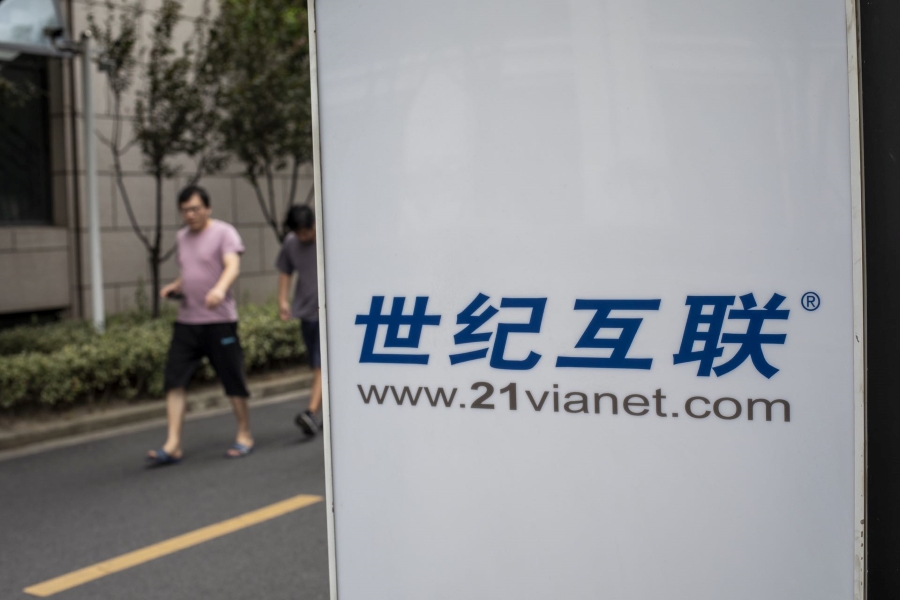Private Equity Buyers Swirl Around VNET. But Will They Find Any Value?

MBK Partners and several other private equity firms are weighing bids for the least-respected of China’s three independent data center operators, according to a media report
Key Takeaways:
- Korea’s MBK Partners is reportedly weighing a bid for VNET Group, three months after the data center operator received an unsolicited offer from another private equity firm
- VNET’s shares have stagnated since it received an original April buyout offer from Hina, indicating investors believe a deal for the company is unlikely
By Doug Young
VNET Group Inc.’s (VNET.US) days as an independent data center operator look numbered, with word that several private equity companies may be weighing bids for the company.
This particular development is the latest in a story dating back to April, when VNET, the least-respected of China’s three overseas-listed data center operators, disclosed it had received an unsolicited bid for the company from a Chinese consortium. The latest potential bidders include South Korea’s MBK Partners and other unnamed investors, according to a Bloomberg report citing unnamed sources.
There wasn’t much more to the Bloomberg report, which said MBK was only considering a bid and hadn’t made any formal offer yet. It added MBK was in talks with other potential financial backers for such a bid, but wasn’t more specific. VNET’s latest market value stands at about $680 million, meaning any such bid would likely cost $800 million or more if we assume a premium of 20% to VNET’s latest closing price.
Based on this latest development, we can say with relative certainty what’s probably happening behind the scenes with this story.
VNET was caught by surprise when it received the original unsolicited bid in April from Chinese private equity firm Hina Group with financial backing from the Shanghai branch of Industrial Bank Co. Ltd. In order to pump up the potential purchase price, VNET management, led by founder and Chairman Chen Sheng, is now trying to get other investors interested in making rival bids.
The only problem is that nobody seems to be that interested, at least based on VNET’s stock price in the three months since the original bid was announced. That’s not too surprising, since VNET is easily investors’ least favorite stock among China’s three overseas-listed independent data center operators, the other two being GDS (GDS.US; 9698.HK) and Chindata (CD.US).
VNET’s shares actually did jump as much as 19% in pre-market trade on Wednesday and ultimately closed up 10% at $5.20 the day after the Bloomberg story came out. But the shares are down 42% so far this year. What’s more, the stock now trades well below the $8 price given in the original Hina offer in April, indicating investors aren’t confident a deal will be reached at that price.
VNET’s stock has lost about two-thirds of its value over the last year, and has been generally shunned by investors due to its position as the weakest of the three Chinese data center operators. It reported 18.6% revenue growth to 1.65 billion yuan ($244 million) in this year’s first quarter, which was well behind the 43% and 31.5% growth rates for Chindata and GDS, respectively, in that period.
All three companies have spotty profitability records, which means we need to look at their price-to-sales (P/S) and price-to-book (P/B) ratios for comparisons. In this regard VNET is again the weakest, with P/S and P/B ratios that are both well below 1. By comparison, GDS trades at a P/S ratio of 4.2 and P/B of 1.5, while Chindata trades at a 5.3 P/S and a 1.6 P/B. Global player Equinix (EQIX.US) also trades at a much higher P/S of 8.8 and P/B 5.4.
Stagnation ahead?
Having established that VNET is the unwanted stepchild of China’s three major data center operators, we’ll briefly discuss what’s likely to happen next.
Investors clearly don’t seem to expect a bidding war, or if they do the price will stay well below the $8 from the original Hina bid. At the same time, any successful bid will almost certainly need the support of founder and Chairman Chen Sheng, who currently controls 28.8% of the company’s voting rights, according to VNET’s latest annual report.
While that amount isn’t enough to block a deal outright, it’s enough to cause lots of headaches and delays if any bidder tries to win over VNET’s other shareholders to a deal that isn’t to Chen’s liking.
As we’ve said earlier, the attempt to bring in new bidders is almost certainly being led by Chen, though it does seem highly unlikely that MBK Partners or any other bidder would be willing to match the original offer of $8 per share from Hina. But Chen is probably like many Chinese tech company founders, believing his company is underappreciated by the market, and thus is unlikely to accept any offer he believes is too low.
Accordingly, the most likely outcome could be a privatization offer led by Chen, assuming he can find any financial backers willing to pay the premium required to take the company private. But if the offer price is less than $8, minority investors could well protest, leading to some colorful drama that we’ve seen quite a few times surrounding buyout attempts for Chinese companies.
We suspect this entire drama could end in a stalemate, with VNET’s shares simply continuing to languish on the Nasdaq.
That scenario would contrast sharply with similar rumblings now taking place at Chindata, which is an investor darling due to its rapid growth and also its connections to global private equity giant Bain Capital, which controls 85.6% of Chindata’s voting rights. Bloomberg previously reported in April that Chindata had received interest in a potential buyout from GDS, as well as from Asian private equity firm PAG.
But whereas VNET’s shares are now trading at roughly the same level where they were before the earlier unsolicited Hina bid, Chindata’s shares have gained 68% since the Bloomberg report on the interest from GDS and PAG came out. That would seem to indicate investors are much more confident that a Chindata sale will materialize, and we’ve previously said a combination with GDS looks quite attractive.
At the end of the day it’s hard to see any major new catalysts that might raise VNET shares for the rest of this year. It’s even quite possible they could keep moving downward if no progress on a buyout is announced and the company keeps posting lackluster growth compared with its two rivals. At the same time, a GDS-Chindata combination would create a bigger, better-managed rival that could make life even more difficult for VNET.
To subscribe to Bamboo Works weekly free newsletter, click here






